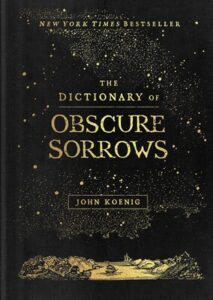“THE DICTIONARY OF OBSCURE SORROWS” by John Koenig
 When I read about “The Dictionary of Obscure Sorrows,” I thought at first, what a strange dictionary.
When I read about “The Dictionary of Obscure Sorrows,” I thought at first, what a strange dictionary.
Then I understood that the author, John Koenig, wants to “shine a light on the fundamental strangeness of being a human being.”
I was expecting that it would not be a happy reading.
Still, I was intrigued and also enlightened by this dictionary.
From all the listed sorrows, I chose the following:
agnosthesia
the state of not knowing how you really feel about something, which forces you to sift through clues hidden in your own behaviour, as if you were some other person—noticing a twist of acid in your voice, an obscene amount of effort you put into something trifling, or an inexplicable weight on your shoulders that makes it difficult to get out of bed.
(ancient Greek)
midding
the tranquil pleasure of being near a gathering but not quite in it—hovering on the perimeter of a campfire, talking quietly outside a party, resting your eyes in the back seat of a car listening to friends chatting up front—feeling blissfully invisible yet still fully included, safe in the knowledge that everyone is together and everyone is okay, with all the thrill of being there without the burden of having to be.
(Middle English)
kinchy
feeling guilty that you care about your own petty concerns more deeply than faraway cataclysms—that a family spat hurts more than a civil war, that a three-day fever hits you harder than climate change.
(Japanese)
fellchaser
a long-forgotten mistake from your past that could reappear at any time and rip your life apart, like a boomerang you tossed away years ago that’s only just now looping back around, which you’d have no idea how to handle because you have no idea what it is.
(From fell+molechaser)
anthrodynia
a state of exhaustion with how cruel people can be, freely undercutting each other in ways that seem petty and gratuitous—which can sometimes trigger a countervailing sense of gratitude for things that are kind, sincere, forgiving, or unabashedly joyful.
(ancient Greek)
Publisher: SIMON &SCHUSTER, 2021

Recent Comments